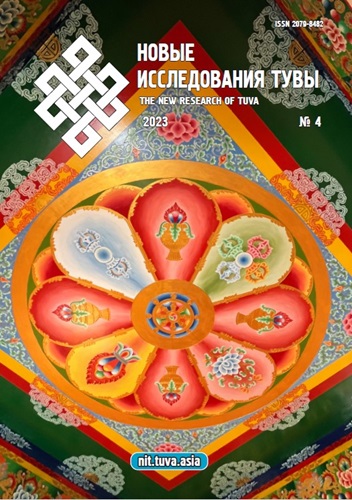Ecologization of the tradition of tying zurams, khadaks and khii-morins at places of worship in the Republic of Buryatia
DOI:
https://doi.org/10.25178/nit.2023.4.23Keywords:
tradition transformation; ecology; Buddhism; sacred place; ritual ribbon; zuram; hadak; hiy-morin; BuryatiaAbstract
The study examines the phenomenon of the transformation of the Buddhist tradition of offering ritual ribbons and flags (zurams, hadaks, and hiy-morins) in the Republic of Buryatia under the influence of environmental demands. Empirical data were gathered during field expeditions to sacred sites and Buddhist monasteries in the Republic of Buryatia from 2020 to 2023. The research involved the collection of photographic evidence, interviews with Buddhist lamas, temple personnel, and laypersons, as well as an analysis of organization websites and materials from the regional press.
Initially, the tradition itself, associated with offerings, did not pose any negative environmental impact since the fabrics used were natural and biodegradable, and the method of tying employed by believers was not tight. However, contemporary practices have undergone significant changes, including the use of artificial fabrics for ribbons. This tradition became widespread and began to harm trees due to the substantial number of ribbons tied to them. Additionally, a consequence of the COVID-19 pandemic was the emergence of a new trend: tourists started tying medical items, such as masks and tissues, at sacred sites.
Since 2014, the Buddhist Traditional Sangha of Russia has urged believers to address this issue, leading to lamas and activists performing cleansing rituals at worship sites. This initiative has facilitated the promotion of environmental awareness among the population. Thus, the authors highlight a rational approach by religious and social movements in the republic to rectify the situation.
References
Abaev, N. V., Gerasimova, K. M. and Zheleznov, A. I. (1992) Ekologicheskie traditsii v kul'ture narodov Tsentral'noi Azii [Ecological traditions in the culture of the peoples of Central Asia]. Novosibirsk, Nauka. 160 p. (In Russ.).
Amogolonova, D. D. (2017) Khambo lama Damba Aiusheev i ego rol' v sovremennom buddiiskom vozrozhdenii Buriatii [Hambo Lama Damba Ayusheev and his role in the modern Buddhist revival of Buryatia]. Gumanitarnye issledovaniia v Vostochnoi Sibiri i na Dal'nem Vostoke, no. 2, pp. 33–42. (In Russ.).
Atfild, R. (1990) Etika ekologicheskoi otvetstvennosti [Ethics of environmental responsibility]. In: Global'nye problemy i obshchechelovecheskie tsennosti [Global problems and universal values] : transl. from Engl. and Fr. / comp. by L. I. Vasilenko and V. E. Ermolaeva. Moscow, Progress. 495 p. Pp. 203–258. (In Russ.).
Bakaeva, E. P. (2015) K issledovaniiu etnicheskoi spetsifiki obraza bozhestva Belyi starets u oiratov Mongolii i kalmykov Rossii (po materialam polevoi ekspeditsii po Ubsunurskomu aimaku Mongolii) [To study the ethnic specifics of the Image of the White Elder deity among the Oirats of Mongolia and the Kalmyks of Russia (based on the materials of a field expedition to the Ubsunur Aimag of Mongolia)]. Problemy etnicheskoi istorii i kul'tury tiurko-mongol'skikh narodov, no. 3, pp. 43–78. (In Russ.).
Budaeva, D. Ts. and Zhilkina, M. V. (2016) Etnoekologicheskaia etika kak faktor ustoichivogo razvitiia mira [Ethno-ecological ethics as a factor of sustainable development of the world]. In: Proekt evraziiskoi ekologicheskoi tsivilizatsii (na primere ustoichivogo razvitiia Baikal'skogo regiona) [The project of the Eurasian ecological civilization (on the example of the sustainable development of the Baikal region)] / ed. by A. A. Burzalova. Ulan-Ude, Vostochno-Sibirskii gosudarstvennyi universitet tekhnologii i upravleniia. 420 p. Pp. 229–241. (In Russ.).
Budaeva, Ts. B. (2003) Vozrozhdenie ekologicheskikh traditsii buriat [Revival of ecological traditions of the Buryats]. Sotsiologicheskie issledovaniia, no. 6, pp. 120–123. (In Russ.).
Budaeva, Ts. B. (2006) Etnoekologicheskie traditsii narodov Baikal'skogo regiona v usloviiakh transformatsionnykh protsessov: problemy sokhraneniia i razvitiia [Ethnoecological traditions of the peoples of the Baikal region in the conditions of transformation processes: problems of preservation and development]. Ulan-Ude, VSGTU. 297 p. (In Russ.).
Vinokurova, U. A. (2017) Iakutskie tsennosti v nachale XXI veka [Yakut values at the beginning of the 21st century]. New Research of Tuva, no. 3, pp. 84–99. (In Russ.). DOI: https://doi.org/10.25178/nit.2017.3.5
Vinokurova, U. A. (2020) Printsipy Strategii ekologicheskogo obrazovaniia v Respublike Sakha [Principles of the Strategy of Environmental Education in the Sakha Republic]. In: Sotsial'nye riski v sovremennom obshchestve [Social risks in modern society] / ed. by G. V. Zhigunova. Krasnoiarsk, Nauchno-innovatsionnyi tsentr. 338 p. Pp. 44–48. (In Russ.).
Vinokurova, U. A. and Zakharova, A. E. (2022) Aksiologicheskie osnovaniia ekodukhovnykh tsennostei korennykh narodov Arktiki [Axiological Foundations of Eco-Spiritual Values of Indigenous Peoples of the Arctic]. Man and Culture, no. 6, pp. 68–77. (In Russ.). DOI: https://doi.org/10.25136/2409-8744.2022.6.39467
Gerasimova, I. A. (2021) Ot modernizatsii k ekologizatsii. Geoekologiia i geosotsial'nost' [From Modernization to Greening]. Epistemology & Philosophy of Science, vol. 58, no. 1, pp. 8–21. (In Russ.). DOI: https://doi.org/10.5840/eps20215812
Zaika, V. V. (2020) Istoriia razvitiia ekologicheskikh issledovanii v Tuve [The development of environmental studies in Tuva]. New Research of Tuva, no. 2, pp. 241–259. (In Russ.). DOI: https://doi.org/10.25178/nit.2020.2.17
Kun', W. (2022) Buddizm v sovremennom Kitae [Buddhism in Modern China]. Gosudarstvo, religiia, Tserkov' v Rossii i za rubezhom, vol. 40, no. 2, pp. 202–211. (In Russ.). DOI: https://doi.org/10.22394/2073-7203-2022-40-2-202-211
Lenkhoboeva, T. R. (2021) Ekologicheskaia etika buddizma v regional'nykh SMI (na primere Respubliki Buriatiia): sposoby konstruirovaniia [Environmental ethics of Buddhism in regional mass media (based on the example of the Republic of Buryatia): methods of construction]. Litera, no. 11, pp. 98–105. (In Russ.). DOI: https://doi.org/10.25136/2409-8698.2021.11.36867
Sodnompilova, M. M. (2023) «Iazyk» lesa v informatsionnom prostranstve kochevoi kul'tury na primere tiurko-mongol'skikh narodov [The ‘Language’ of Forest in Information Space of Nomadic Culture: A Case Study of Turkic and Mongolic Peoples]. Mongolian Studies, vol. 15, no. 1, pp. 129–141. (In Russ.). DOI: https://doi.org/10.22162/2500-1523-2023-1-129-141
Sodnompilova, M. M., Amogolonova, D. D. (2020) Traditsionnye i novye mesta religioznogo palomnichestva v Buriatii [Traditional and New Places of Religious Pilgrimage in Buryatia]. Etnograficheskoe obozrenie, no. 2, pp. 47–60. (In Russ.). DOI: https://doi.org/10.31857/S086954150009604-4
Syrtypova, S. D. (2005) Pamiatniki kochevogo mira Transbaikal'ia [Monuments of the nomadic world of Transbaikalia]. Vostok. Afro-aziatskie obshchestva: istoriia i sovremennost', no. 5, pp. 17–27. (In Russ.).
Syrtypova S. D. (2007) Sviatyni kochevnikov Transbaikal'ia (Traditsionnye kul'tovye ob"ekty kak pamiatniki istorii i kul'tury) [Shrines of the Trans-Baikal nomads (Traditional places of worship as monuments of history and culture)]. Ulan-Ude, Izd-vo Buriatskogo gosuniversiteta. 269 p. (In Russ.).
Tadina, N. A. (2020) Sovremennyi burkhanizm cherez istoriiu v ritual'noi zhizni altaitsev [Modern Burkhanism through the History in the Ritual Life of the Altai People]. Bulletin of the Irkutsk state university. Geoarchaeology, ethnology, and anthropology series, vol. 31, pp. 31–40. DOI: https://doi.org/10.26516/2227-2380.2020.31.31 (In Russ.).
Turlunova, S. N. (1998) Traditsionnaia ekologicheskaia etika altaiskikh okhotnikov [Traditional ecological ethics of Altai hunters]. In: Etnografiia Altaia i sopredel'nykh territorii [Ethnography of Altai and adjacent territories] / ed. by M. A. Demin and T. K. Shcheglova. Barnaul, Barnaul'skii gosudarstvennyi pedagogicheskii universitet. 264 p. Pp. 237–238. (In Russ.).
Uait, L., ml. (1990) Istoricheskie korni nashego ekologicheskogo krizisa [The historical roots of our ecological crisis]. In : Global'nye problemy i obshchechelovecheskie tsennosti [Global problems and universal values]: transl. from Engl. and Fr. / comp. by L. I. Vasilenko and V. E. Ermolaeva. Moscow, Progress. 495 p. Pp. 188–202. (In Russ.).
Sharaeva, T. I. (2010) Sovremennoe bytovanie sakral'nogo markera ölgts u kalmykov (po materialam polevykh issledovanii 2008–2010 gg.) [The modern existence of the sacred marker olgts among the Kalmyks (based on the materials of field research 2008-2010)]. Problemy etnicheskoi istorii i kul'tury tiurko-mongol'skikh narodov, no. 2, pp. 158–186. (In Russ.).
Yabyshtaev, T. S. (2020) Problema sobliudeniia rodovykh traditsii u altaitsev v sovremennykh usloviiakh [The problem of keeping general traditions with the Altai people in modern conditions]. Sokhranenie i izuchenie kul'turnogo naslediia Altaiskogo kraia, no. 26, pp. 306–310. (In Russ.). DOI: https://doi.org/10.14258/2411-1503.2020.26.50
Batchelor, M. and Brown, K. (1992) Buddhism and Ecology. London; New York: Motilal Banarsidass. 112 p.
Dondukov, B. (2021) Public Discourse of Buddhist Leaders in the Context of Forest Fires in the Republic of Buryatia, Russia. International Journal of Religion and Spirituality in Society, vol. 11, no. 2, pp. 131–140. DOI: https://doi.org/10.18848/2154-8633/CGP/v11i02/131-140
Escario, J. J. Rodriguez-Sanchez, C., Valero-Gil, J. and Casaló, L. V. (2022) COVID-19 related policies: The role of environmental concern in understanding citizens’ preferences. Environmental Research, vol. 211, pp. 1–11. DOI: https://doi.org/10.1016/j.envres.2022.113082
Hargrove, E. (1989) Foreword. In: Nature in Asian Traditions of Thought: Essays in Environmental Philosophy. Ed. by J. B. Callicott, R. T. Ames. N-Y., State University of New York Press. 360 p. P. xiii–1.
Kaza, S., Kenneth, K., eds. (2000) Dharma Rain. Berkeley, Shambhala. 504 p.
Severo, E. A., De Guimarães, J. C. F. and Dellarmelin, M. L. (2021) Impact of the COVID-19 pandemic on environmental awareness, sustainable consumption and social responsibility: Evidence from generations in Brazil and Portugal. Journal of cleaner production, vol. 286, 124947. DOI: https://doi.org/10.1016/j.jclepro.2020.124947
Published
How to Cite
For citation:
Dorzhigushaeva O. V. and Kiplyuks A. V. Ekologizatsiia traditsii zaviazyvaniia zuram, khadakov i khii-morin na mestakh pokloneniia v Respublike Buriatiia [Ecologization of the tradition of tying zurams, khadaks and khii-morins at places of worship in the Republic of Buryatia]. New Research of Tuva, 2023, no. 4, pp. 328-343. DOI: https://doi.org/10.25178/nit.2023.4.23
Issue
Section

This work is licensed under a Creative Commons Attribution-NonCommercial 4.0 International License.

Author(s) license holder(s) grant rights for their work to the journal (grantee of a license) under the simple non-exclusive open license in accordance with Art. 1286.1 «Open license for a research work, work of literature or fine arts», Civil Code of the Russian Federation.
New Research of Tuva publishes articles under the Creative Commons Attribution-NonCommercial license (CC BY-NC).
Since it is an open license, author(s) reserve the right to upload the article to their institutional repository, submit it to another journal (if it allows republications), or republish it on their own website (in full, or in part).
However, several conditions apply here:
a) The republished version must always contain the name(s) and affiliation(s) of the author(s), the original title and the hyperlink to the original version on the New Research of Tuva website;
b) It must be in open access, free of charge, and no category of readers must be in any way whatsoever advantaged over general readership.
c) should the contribution be submitted elsewhere by its author(s) without substantial modification (30% or more of original text unchanged), the body of the article should contain a disclaimer that the original version was published in New Research of Tuva (with a link to the respective page)
The CC-BY-NC is a non-revocable license which applies worldwide and lasts for the duration of the work’s copyright.










